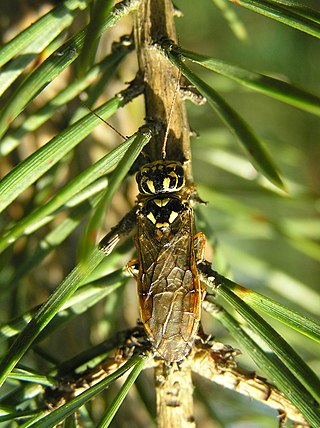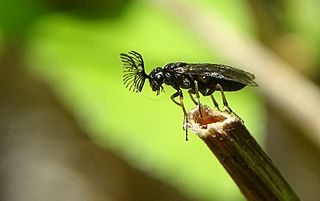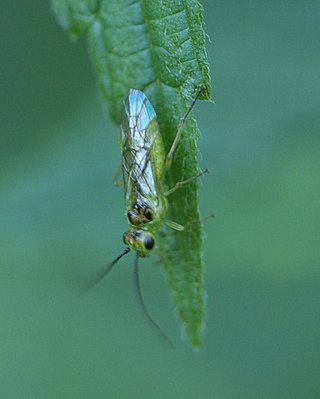
Sawflies are wasp-like insects that are in the suborder Symphyta within the order Hymenoptera, alongside ants, bees, and wasps. The common name comes from the saw-like appearance of the ovipositor, which the females use to cut into the plants where they lay their eggs. The name is associated especially with the Tenthredinoidea, by far the largest superfamily in the suborder, with about 7,000 known species; in the entire suborder, there are 8,000 described species in more than 800 genera. Symphyta is paraphyletic, consisting of several basal groups within the order Hymenoptera, each one rooted inside the previous group, ending with the Apocrita which are not sawflies.

The Orussidae or the parasitic wood wasps represent a small family of sawflies ("Symphyta"). Currently, about 93 extant and four fossil species are known. They take a key position in phylogenetic analyses of Hymenoptera, because they form the sister taxon of the megadiverse apocritan wasps, and the common ancestor of Orussidae + Apocrita evolved parasitism for the first time in course of the evolution of the Hymenoptera. They are also the only sawflies with carnivorous larvae.

The Xyelidae are a comparatively species-poor family of sawflies, comprising about 80 extant species in five genera worldwide, and is the only family in the superfamily Xyeloidea. The fossil record of the family is extensive, comprising more than 120 species and including the oldest fossil Hymenoptera species dating back to the Triassic, between 245 and 208 million years ago. Xyelidae are to be regarded as living fossils since they represent one of the oldest lineages of insects and include still extant forms.

The Pamphilioidea are a small superfamily within the Symphyta, containing some 250 living species restricted to the temperate regions of Eurasia and North America. These hymenopterans share the distinctive feature of a very large, almost prognathous head, which is widest ventrally.

Cimbicidae, the Clubhorn Sawfly, is a family of sawflies in the order Hymenoptera. There are more than 20 genera and 200 described species in Cimbicidae. Larvae are solitary herbivores.

The Diprionidae are a small family of conifer-feeding sawflies restricted to the Northern Hemisphere, with some 140 species in 13 genera. Larvae are often gregarious, and sometimes there can be major outbreaks, thus these sawflies can be major forest pests at times. These sawflies have the ability to compromise the health and ecological balance of forests. When the temperatures begin to rise, the sawflies become strengthened pests to these conifers. In doing so, they cause damage to a certain extent.

Tenthredinidae is the largest family of sawflies, with well over 7,500 species worldwide, divided into 430 genera. Larvae are herbivores and typically feed on the foliage of trees and shrubs, with occasional exceptions that are leaf miners, stem borers, or gall makers. The larvae of externally feeding species resemble small caterpillars. As with all hymenopterans, common sawflies undergo complete metamorphosis.

Nematinae is a subfamily of sawflies belonging to the family Tenthredinidae. It contains over 1250 described species in ~40 genera. Members of this subfamily feed on a wide range of plants and employ a wide range of feeding habits, both internally and externally, on their host plants.

The Polycnemoideae are a small subfamily of plants in the family Amaranthaceae, representing a basal evolutionary lineage. The few relictual species are distributed in Eurasia and North Africa, North America, and Australia.
Hemichroa is a small genus of plants in the family Amaranthaceae containing three species. It is endemic to Australia.
Hemichroa pentandra, commonly known as trailing hemichroa, trailing saltstar or trailing jointweed, is a prostrate perennial herb in the amaranth family. It is endemic to Australia. A succulent halophyte, it grows to about 10 cm in height and 30 cm wide. It has tiny, inconspicuous white flowers, surrounded by papery bracts, which grow in the angle between the stem and the 12 mm long leaves. It is found in coastal salt marshes and around salt lakes.

Hemichroa australis is a species of sawflies in the family Tenthredinidae.

Hemichroa crocea, the striped alder sawfly or banded alder sawfly, is a species of sawfly in the family Tenthredinidae. It is probably native in Europe and has been introduced to North America. The larvae feed on the foliage of several species of alder and sometimes on birch, hazel and willow.

South African Wrestling Federation (SAWF) is the organization that governs amateur freestyle wrestling and Greco-Roman wrestling for men and women in South Africa. South African Wrestling Federation is affiliated to United World Wrestling (UWW) and is the national governing body of the sport. SAWF is also affiliated to SASCOC, and organizes national competitions such as the SAWF Presidents and Masters Championship.

The South African Wushu Federation (SAWF) is the national governing body for the development and promotion of the sport of wushu also known as kung fu in South Africa. The Federation was formed in 2002.

Eriocampa ovata, known generally as the alder sawfly or woolly alder sawfly, is a species of common sawfly in the family Tenthredinidae. The larvae feed on the leaves of the common alder and the grey alder, sometimes causing defoliation.

Nematini is a tribe of common sawflies in the family Tenthredinidae. There are about 14 genera and at least 30 described species in Nematini.
Brigid Mary Cotter, was a pioneering Irish chemist and barrister.

Euura californica, generally known as the willow apple gall sawfly, is a species of common sawfly in the family Tenthredinidae. The sawfly lays eggs within arroyo willow leaves; the gall that develops around the eggs serves as an insect nursery. At maturity, adult sawflies create an exit hole in the gall from which they emerge. This sawfly "breeds year-round, producing as many as six generations" in certain locations.















